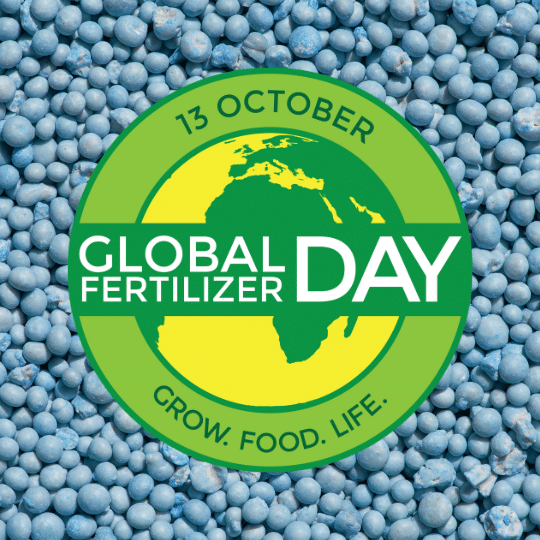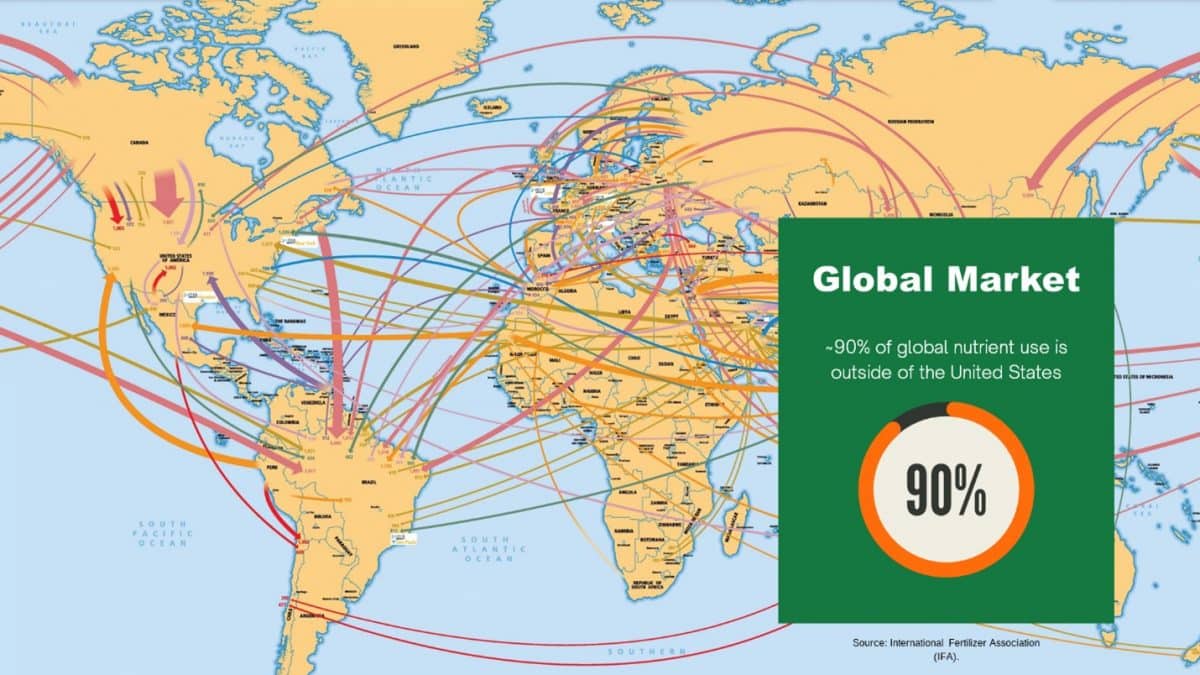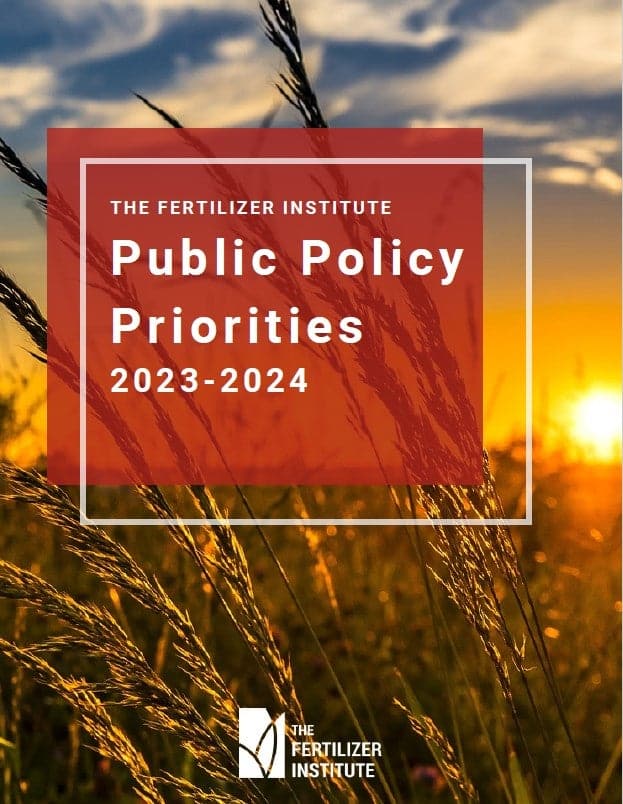ARLINGTON, VA – The Fertilizer Institute (TFI) today released its list of 2023-2024 public policy priorities for working with the Biden Administration, regulatory agencies, and a closely divided 118th Congress.
“With the 118th Congress underway, we are strongly advocating for policies that ensure the fertilizer industry is able to continue feeding the world sustainably through innovation, efficiency, and legislative and regulatory updates that are long overdue,” said TFI President and CEO Corey Rosenbusch. “We’re also very much looking forward to engaging on the Farm Bill and finding bipartisan solutions that will strengthen farmers’ bottom lines and environmental stewardship.”
TFI’s priorities are broken down into seven key areas: Economic Growth & Competitiveness; Transportation & Infrastructure; Environment; Safety & Security; Farm Bill Reauthorization; Permitting & Registration; and Innovation.
“Fertilizer is a globally traded commodity and heavily influenced by geopolitical events. Over the past two years we have seen major market disruptions that make clear the need to strengthen domestic production,” Rosenbusch continued. “The Biden Administration’s $500 million grant program is a great start, but what the industry needs is significant change in permitting policy, and ensuring producers have access to critical inputs and affordable energy.”
Those changes include reforming the National Environmental Policy Act (NEPA), which sets forth a convoluted, time consuming, and expensive permitting process; the designation by the United States Geological Service (USGS) of phosphate and potash as critical minerals; and policies that ensure safe, secure, and reliable access to affordable energy.
“The Farm Bill for us is all about conservation and continuing to push for science-backed 4R Nutrient Stewardship adoption by growers and removing the existing barriers to grower adoption,” Rosenbusch said. “Policies we want to see included are recognizing Certified Crop Advisors (CCAs) as Technical Service Providers (TSPs), which will enable greater cost-share opportunities for growers working with agricultural retailers. Additionally, we’re pushing for financial incentives to growers through use of the Conservation Service Model to utilize conservation and environmental best practices.”
Strengthening the domestic fertilizer industry and pushing for policies that promote grower adoption of nutrient stewardship practices are a heavy focus, but not the only ones eyed by TFI.
“Transportation and infrastructure are always big issues for us. Fertilizer needs to be delivered to growers exactly when and where they need it and there is not much room for error or delay,” Rosenbusch explained. “Supply chain disruptions have hit all industries hard, but fertilizer delays can lead to lower crop yields and less food. Fertilizer moves year-round via railways, highways, waterways, and pipelines, and we need a safe and reliable infrastructure network. Food security is national security, and fertilizer availability is paramount to keeping us all fed.”
Innovation and 4R research are two areas where TFI has hit the ground running, with the Plant Biostimulant Act and the ACE Agriculture Act both introduced in each chamber of Congress in March.
“Biostimulants are a relatively new innovation in agriculture,” Rosenbusch explained. “There is great potential in these products, but as with any new technology there are hurdles.”
Among the biggest of the hurdles mentioned by TFI’s Rosenbusch are the lack of a clear and consistent definition for “biostimulant” and the fact that there is no uniform framework to regulate them as plant nutrition products.
“TFI and our members are excited about biostimulants and we’re also introducing a Biostimulant Certification Program in the coming months. The aim of the program is to foster growth and farmer confidence in this innovative space,” said Rosenbusch.
The ACE Agriculture Act will help farmers by focusing United States Department of Agriculture (USDA) research on critical areas such as soil health and increasing crop yields. The fertilizer industry has long supported agricultural research through the 4R Research Fund, as well as independent research that has focused on multiple crops, geographic locations, and methods to show farmers the beneficial outcomes of new technologies and farming practices. In addition to industry efforts through the 4R Research Fund, TFI is a year and a half into a nationwide goal of having 70 million US farming acres under 4R nutrient stewardship management by 2030.
“We’ve done the research and know that these practices have both environmental and economically beneficial outcomes associated with their implementation,” Rosenbusch continued. “But these practices are not one-size fits all and not only is each farm different, but each acre on each farm is unique and growers need to feel confident when implementing new practices. We believe more research directly from the USDA on these critical issues can only help farmers continue growing that confidence and lead to wider farmer adoption.”
TFI will use its member-driven public policy priorities to educate policymakers on the realities of an essential industry that is responsible for half of all food grown around the world. “Our industry is vital to ensuring our farmers can enrich the soil and grow the crops that feed the world and its growing population,” Rosenbusch concluded. “We look forward to working with the Biden Administration and the 118th Congress.”
TFI’s full list of 2023-2024 public policy priorities can be found here.
###
The Fertilizer Institute (TFI) is the leading voice of the nation’s fertilizer industry. Tracing its roots back to 1883, TFI’s membership includes fertilizer producers, wholesalers, retailers and trading firms. TFI’s full-time staff, based in Washington, D.C., serves its members through legislative, educational, technical, economic information and public communication programs. Find more information about TFI online at TFI.org and follow us on Twitter at @Fertilizer_Inst. Learn more about TFI’s nutrient stewardship initiatives at nutrientstewardship.org and on Twitter at @4rnutrients.








